Module 5 Lao She's Teahouse.Unit 3 Language in use 课件(共29张PPT)
文档属性
| 名称 | Module 5 Lao She's Teahouse.Unit 3 Language in use 课件(共29张PPT) | 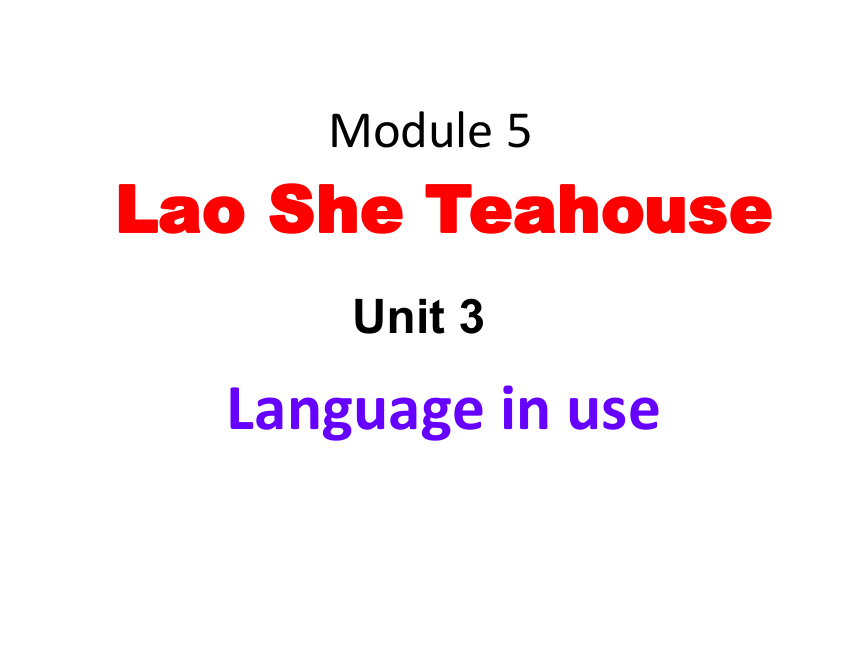 | |
| 格式 | zip | ||
| 文件大小 | 159.6KB | ||
| 资源类型 | 教案 | ||
| 版本资源 | 外研版 | ||
| 科目 | 英语 | ||
| 更新时间 | 2018-12-24 08:27:42 | ||
图片预览

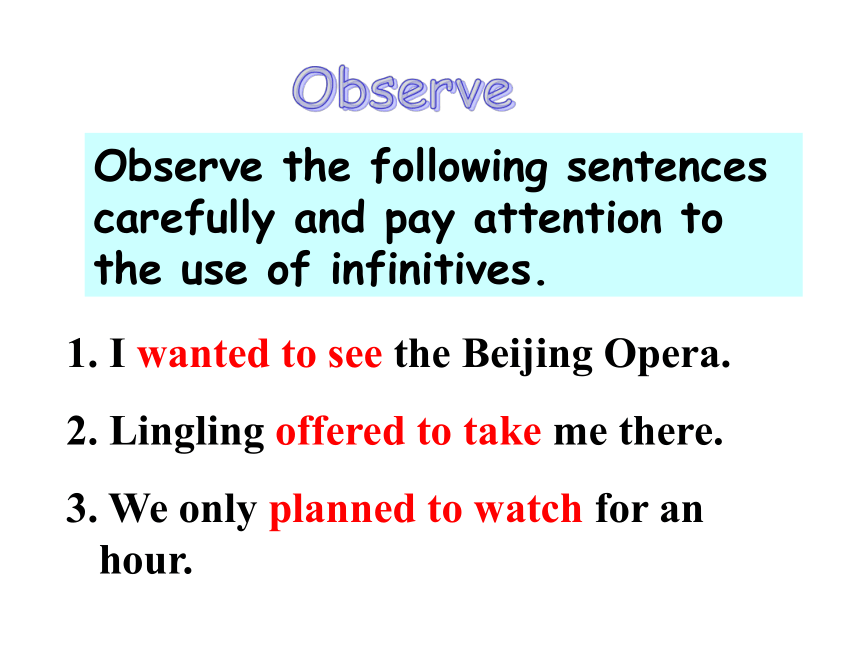
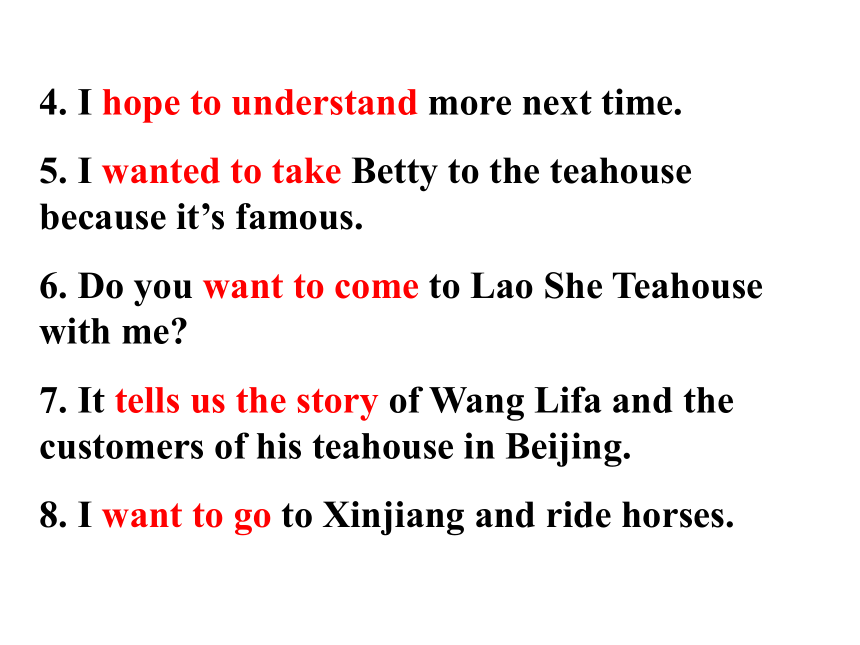
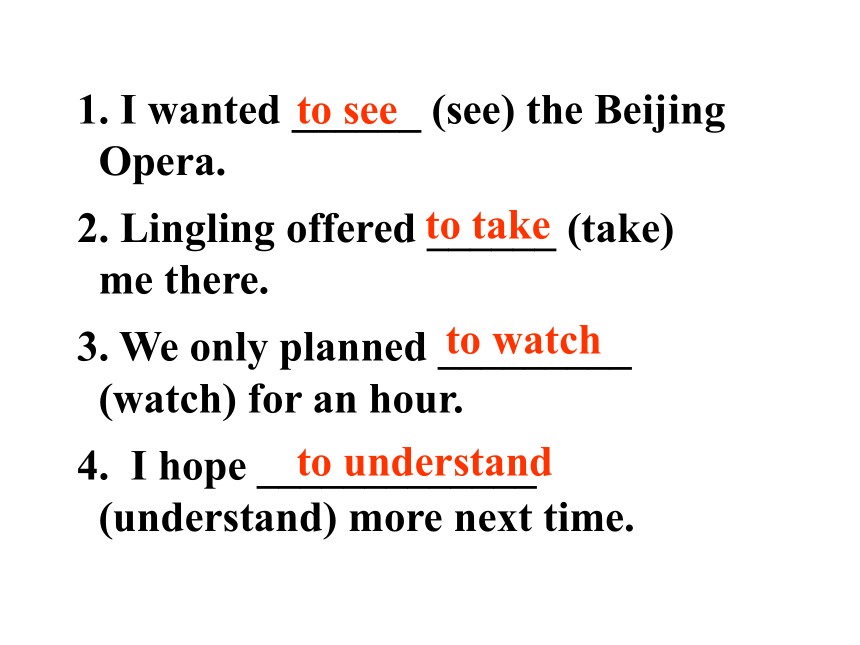
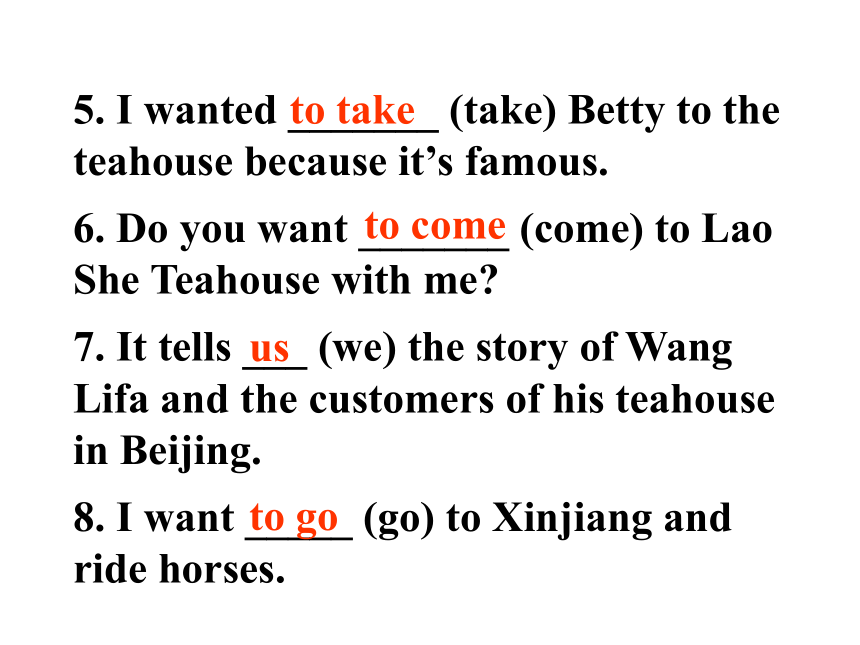
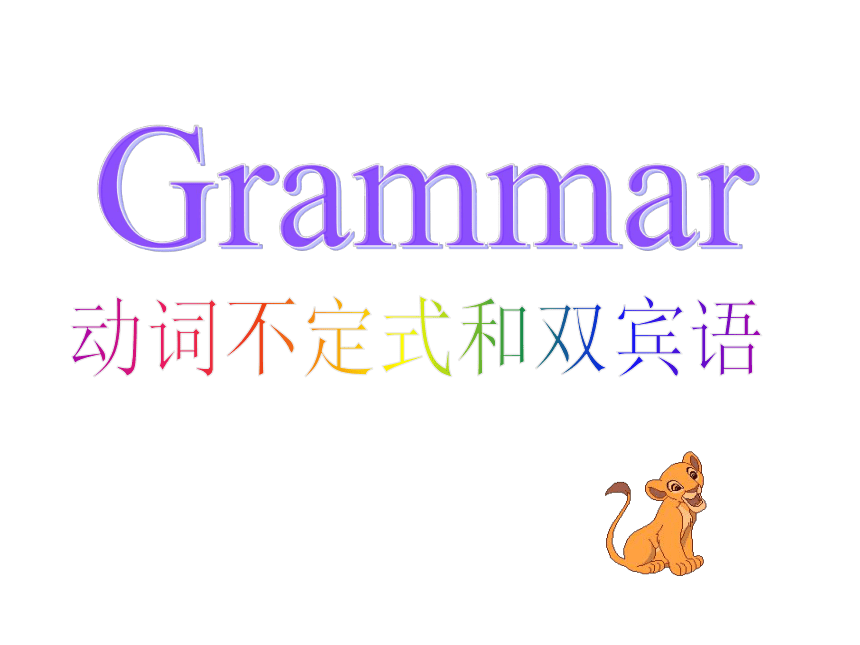
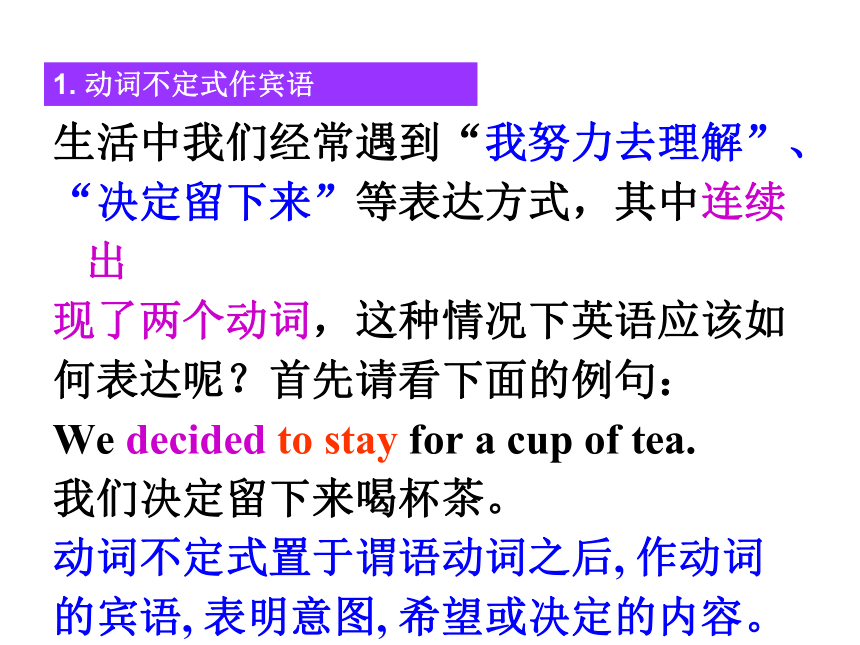
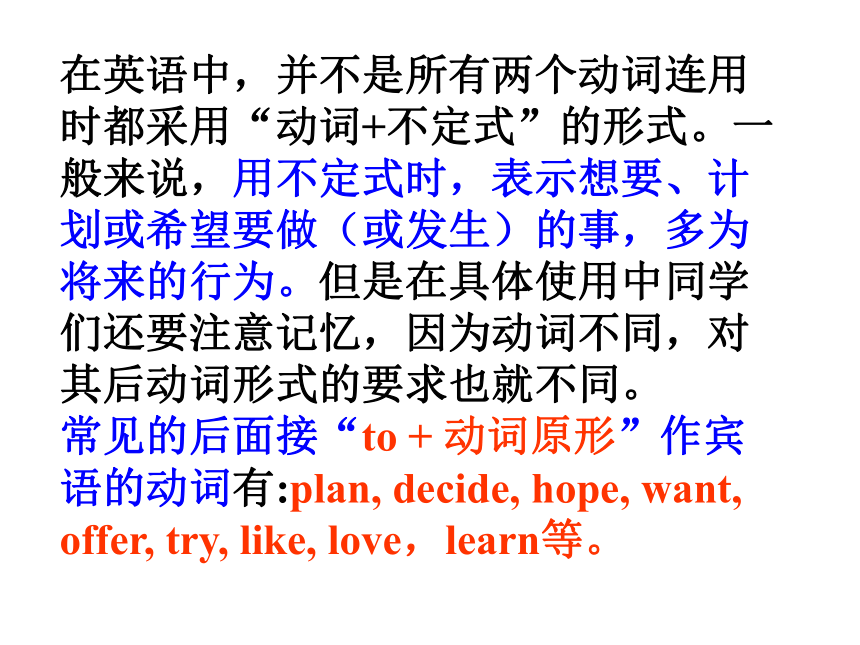
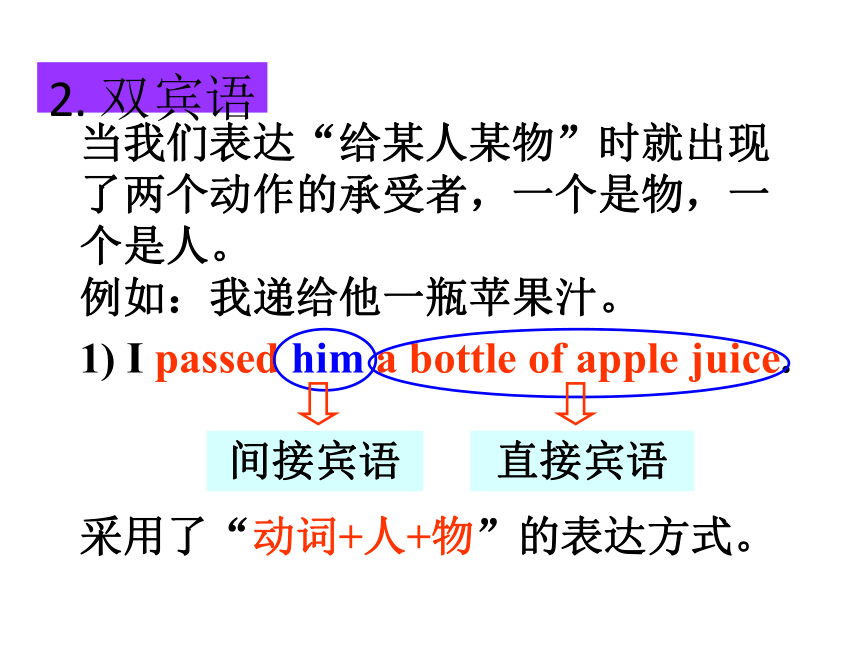
文档简介
课件29张PPT。Module 5 Lao She TeahouseLanguage in useUnit 3ObserveObserve the following sentences carefully and pay attention to the use of infinitives. I wanted to see the Beijing Opera.
Lingling offered to take me there.
We only planned to watch for an hour.4. I hope to understand more next time.
5. I wanted to take Betty to the teahouse because it’s famous.
6. Do you want to come to Lao She Teahouse with me?
7. It tells us the story of Wang Lifa and the customers of his teahouse in Beijing.
8. I want to go to Xinjiang and ride horses. 1. I wanted ______ (see) the Beijing Opera.
2. Lingling offered ______ (take) me there.
3. We only planned _________ (watch) for an hour.
4. I hope _____________ (understand) more next time.to seeto taketo watchto understand5. I wanted _______ (take) Betty to the teahouse because it’s famous.
6. Do you want _______ (come) to Lao She Teahouse with me?
7. It tells ___ (we) the story of Wang Lifa and the customers of his teahouse in Beijing.
8. I want _____ (go) to Xinjiang and ride horses.to taketo cometo gousGrammar动词不定式和双宾语生活中我们经常遇到“我努力去理解”、
“决定留下来”等表达方式,其中连续出
现了两个动词,这种情况下英语应该如
何表达呢?首先请看下面的例句:
We decided to stay for a cup of tea.
我们决定留下来喝杯茶。
动词不定式置于谓语动词之后, 作动词
的宾语, 表明意图, 希望或决定的内容。1. 动词不定式作宾语在英语中,并不是所有两个动词连用时都采用“动词+不定式”的形式。一般来说,用不定式时,表示想要、计划或希望要做(或发生)的事,多为将来的行为。但是在具体使用中同学们还要注意记忆,因为动词不同,对其后动词形式的要求也就不同。
常见的后面接“to + 动词原形”作宾语的动词有:plan, decide, hope, want, offer, try, like, love,learn等。2. 双宾语当我们表达“给某人某物”时就出现了两个动作的承受者,一个是物,一个是人。
例如:我递给他一瓶苹果汁。
1) I passed him a bottle of apple juice.
采用了“动词+人+物”的表达方式。间接宾语直接宾语2) I passed a bottle of apple juice to him.间接宾语直接宾语采用了“动词+物+人”的方式。可以接双宾语的动词很多,常见的有:give, bring, pass, send, show, leave, buy, tell, teach, sell等。例如:
My brother bought me some storybooks.
我哥哥给我买了一些故事书。
My uncle gave me a pretty birthday present.
我叔叔给了我一个漂亮的生日礼物。后接介词to 的动词有:give, show, pass,
lend, take, tell 等;后接介词for的动词
有:buy, make, cook, get, sing, read等。
一般来讲,for表示“为某人”,而to表示
“给某人”,即表示某人接受或收到了某
物。如:
give sb. sth. = give sth. to sb.
bring sb. sth. = bring sth. to sb.
lend sb. sth. = lend sth. to sb.hand sb. sth. = hand sth. to sb.
send sb. sth. = send sth. to sb.
show sb. sth. = show sth. to sb.
leave sb. sth. = leave sth. to sb.
teach sb. sth. = teach sth. to sb.
buy sb. sth. = buy sth. for sb.
cook sb. sth. = cook sth. for sb.
read sb. sth. = read sth. for sb.Complete the sentences with the correct form of the words in the box.see spend stay teach writeDo you want to go the teahouse?
1. We decided _______ at home because it was raining.to stay12. Lao She started ________ Chinese in London in 1924.
3. I tried ________ poems.
4. They plan ______ a film tomorrow.
5. I want ________ my holiday in Beijing.to teachto writeto seeto spendRead the conversation and complete the note with the correct form of the words in the box.advise decide offer want2Betty (1) _______to see the Beijing Opera again. Lingling (2)_______ to take her. Daming (3) _______ them to go to Mei Lanfang Theatre. Lingling (4) ______ to go next Saturday.wantedofferedadviseddecidedComplete the passage with the correct form of the words in brackets.Lu Xun is one of the greatest writers of modern China. He was born in Shaoxing, Zhejiang Province, in 1881. At first, Lu Xun hoped (1) _______ (help) the Chinese people become healthy and strong, so he decided (2)_____ (be) a doctor. to helpto be3After a few years, he started (3) _______ (write) short stories because he wanted (4)_______ (teach) people about society. One of his most famous stories is The True Story of Ah Q. It describes the hard life of Ah Q and makes people (5) _____ (think) about society. In the 1920s, people began to translate his works into English.to writeto teachthink notice listen to hear watch 五看 see look at observe三使 let make have 二听一感觉: feel+ sb. do sth.
(不带to的不定式)Acting out a scene from a playModule task:Step 1: Work in groups. Find a play.
Think about these questions.
1. Where does it take place?
2. Who is in it?
3. What is the story?
4. What are the special moments
in it?
Step 2: Choose a scene and practise it.
Step 3: Act out the scene in front of the class.Review1. 动词不定式作宾语的用法;
2. 双宾语的用法;
3. 一些常和不定式连用的动词。复习动词不定式、双宾语QuizⅠ. 用适当的介词完成句子。1. Mary introduced me __ her friend at
the party.
2. I hope the world will be full __ happiness
and fun!
3. What did you think of the play Teahouse
__ Lao She?
4. France is famous ___ its wine and foods.toofbyasⅡ.用括号内所给动词的适当形式填空。
1. It is important for modern young people _______ (learn) at least two foreign languages.
2. The most important thing for one’s
health is ______ (have) plenty of exercise.
3. Ted decided _______ (work) hard and wanted _____ (go) to Beijing University.
4. We found it impossible _____ (get)
everything ready in time.
5. Sue really doesn’t know which book
________ (choose).to learnto haveto workto getto chooseto go6. Mother saved every cent ______ (pay)
for my schooling.
7. Tom asked you _________ (not call) him
until ten o’clock.
8. I don’t think Roger is the best one _____
(do) the work.
9. Why not _____ (walk) to school with me
every day?
10. My host family made me _____ (feel)
being at home.to paynot to callto do walkfeel1. Sally will lend Allan a magazine to read.
Sally will lend a magazine __ _____ to
read.
2. Jackie returned the bike to me yesterday.
Jackie returned __ ___ ____ yesterday.
3. Henry’s pen friend sent him an email.
Henry’s pen friend sent an email __ ___.
4. Please sing us a folk song.
Please sing a folk song ___ __. Ⅲ. 同义句转换。to Allanme the biketo himfor usⅣ. 根据所给汉语提示完成句子。
1. Kent was angry because we didn’t
_____ with (同意) him.
2. Wendy ______ __ (提议) help Linda
with her maths yesterday.
3. The story ____ ____ (发生) in America several years ago.
4. After many months of hard work, Paul won the first prize __ ___ ___ (最后).agreeoffered totook placein the endHomework Review the use of infinitive as objects.
Talk about intentions and plans.
Lingling offered to take me there.
We only planned to watch for an hour.4. I hope to understand more next time.
5. I wanted to take Betty to the teahouse because it’s famous.
6. Do you want to come to Lao She Teahouse with me?
7. It tells us the story of Wang Lifa and the customers of his teahouse in Beijing.
8. I want to go to Xinjiang and ride horses. 1. I wanted ______ (see) the Beijing Opera.
2. Lingling offered ______ (take) me there.
3. We only planned _________ (watch) for an hour.
4. I hope _____________ (understand) more next time.to seeto taketo watchto understand5. I wanted _______ (take) Betty to the teahouse because it’s famous.
6. Do you want _______ (come) to Lao She Teahouse with me?
7. It tells ___ (we) the story of Wang Lifa and the customers of his teahouse in Beijing.
8. I want _____ (go) to Xinjiang and ride horses.to taketo cometo gousGrammar动词不定式和双宾语生活中我们经常遇到“我努力去理解”、
“决定留下来”等表达方式,其中连续出
现了两个动词,这种情况下英语应该如
何表达呢?首先请看下面的例句:
We decided to stay for a cup of tea.
我们决定留下来喝杯茶。
动词不定式置于谓语动词之后, 作动词
的宾语, 表明意图, 希望或决定的内容。1. 动词不定式作宾语在英语中,并不是所有两个动词连用时都采用“动词+不定式”的形式。一般来说,用不定式时,表示想要、计划或希望要做(或发生)的事,多为将来的行为。但是在具体使用中同学们还要注意记忆,因为动词不同,对其后动词形式的要求也就不同。
常见的后面接“to + 动词原形”作宾语的动词有:plan, decide, hope, want, offer, try, like, love,learn等。2. 双宾语当我们表达“给某人某物”时就出现了两个动作的承受者,一个是物,一个是人。
例如:我递给他一瓶苹果汁。
1) I passed him a bottle of apple juice.
采用了“动词+人+物”的表达方式。间接宾语直接宾语2) I passed a bottle of apple juice to him.间接宾语直接宾语采用了“动词+物+人”的方式。可以接双宾语的动词很多,常见的有:give, bring, pass, send, show, leave, buy, tell, teach, sell等。例如:
My brother bought me some storybooks.
我哥哥给我买了一些故事书。
My uncle gave me a pretty birthday present.
我叔叔给了我一个漂亮的生日礼物。后接介词to 的动词有:give, show, pass,
lend, take, tell 等;后接介词for的动词
有:buy, make, cook, get, sing, read等。
一般来讲,for表示“为某人”,而to表示
“给某人”,即表示某人接受或收到了某
物。如:
give sb. sth. = give sth. to sb.
bring sb. sth. = bring sth. to sb.
lend sb. sth. = lend sth. to sb.hand sb. sth. = hand sth. to sb.
send sb. sth. = send sth. to sb.
show sb. sth. = show sth. to sb.
leave sb. sth. = leave sth. to sb.
teach sb. sth. = teach sth. to sb.
buy sb. sth. = buy sth. for sb.
cook sb. sth. = cook sth. for sb.
read sb. sth. = read sth. for sb.Complete the sentences with the correct form of the words in the box.see spend stay teach writeDo you want to go the teahouse?
1. We decided _______ at home because it was raining.to stay12. Lao She started ________ Chinese in London in 1924.
3. I tried ________ poems.
4. They plan ______ a film tomorrow.
5. I want ________ my holiday in Beijing.to teachto writeto seeto spendRead the conversation and complete the note with the correct form of the words in the box.advise decide offer want2Betty (1) _______to see the Beijing Opera again. Lingling (2)_______ to take her. Daming (3) _______ them to go to Mei Lanfang Theatre. Lingling (4) ______ to go next Saturday.wantedofferedadviseddecidedComplete the passage with the correct form of the words in brackets.Lu Xun is one of the greatest writers of modern China. He was born in Shaoxing, Zhejiang Province, in 1881. At first, Lu Xun hoped (1) _______ (help) the Chinese people become healthy and strong, so he decided (2)_____ (be) a doctor. to helpto be3After a few years, he started (3) _______ (write) short stories because he wanted (4)_______ (teach) people about society. One of his most famous stories is The True Story of Ah Q. It describes the hard life of Ah Q and makes people (5) _____ (think) about society. In the 1920s, people began to translate his works into English.to writeto teachthink notice listen to hear watch 五看 see look at observe三使 let make have 二听一感觉: feel+ sb. do sth.
(不带to的不定式)Acting out a scene from a playModule task:Step 1: Work in groups. Find a play.
Think about these questions.
1. Where does it take place?
2. Who is in it?
3. What is the story?
4. What are the special moments
in it?
Step 2: Choose a scene and practise it.
Step 3: Act out the scene in front of the class.Review1. 动词不定式作宾语的用法;
2. 双宾语的用法;
3. 一些常和不定式连用的动词。复习动词不定式、双宾语QuizⅠ. 用适当的介词完成句子。1. Mary introduced me __ her friend at
the party.
2. I hope the world will be full __ happiness
and fun!
3. What did you think of the play Teahouse
__ Lao She?
4. France is famous ___ its wine and foods.toofbyasⅡ.用括号内所给动词的适当形式填空。
1. It is important for modern young people _______ (learn) at least two foreign languages.
2. The most important thing for one’s
health is ______ (have) plenty of exercise.
3. Ted decided _______ (work) hard and wanted _____ (go) to Beijing University.
4. We found it impossible _____ (get)
everything ready in time.
5. Sue really doesn’t know which book
________ (choose).to learnto haveto workto getto chooseto go6. Mother saved every cent ______ (pay)
for my schooling.
7. Tom asked you _________ (not call) him
until ten o’clock.
8. I don’t think Roger is the best one _____
(do) the work.
9. Why not _____ (walk) to school with me
every day?
10. My host family made me _____ (feel)
being at home.to paynot to callto do walkfeel1. Sally will lend Allan a magazine to read.
Sally will lend a magazine __ _____ to
read.
2. Jackie returned the bike to me yesterday.
Jackie returned __ ___ ____ yesterday.
3. Henry’s pen friend sent him an email.
Henry’s pen friend sent an email __ ___.
4. Please sing us a folk song.
Please sing a folk song ___ __. Ⅲ. 同义句转换。to Allanme the biketo himfor usⅣ. 根据所给汉语提示完成句子。
1. Kent was angry because we didn’t
_____ with (同意) him.
2. Wendy ______ __ (提议) help Linda
with her maths yesterday.
3. The story ____ ____ (发生) in America several years ago.
4. After many months of hard work, Paul won the first prize __ ___ ___ (最后).agreeoffered totook placein the endHomework Review the use of infinitive as objects.
Talk about intentions and plans.
同课章节目录
- Module 1 How to learn English
- Unit 1 Let's try to speak English as much as possi
- Unit 2 You should smile at her.
- Unit 3 Language in use .
- Module 2 My home town and my country
- Unit 1 It's taller than many other buildings.
- Unit 2 Cambridge is a beautiful city in the east o
- Unit 3 Language in use .
- Module 3 Sports.
- Unit 1 Nothing is more exciting than playing tenni
- Unit 2 This year we training more carefully.
- Unit 3 Language in use .
- Module 4 Planes, ships and trains .
- Unit 1 He lives the farthest from school.
- Unit 2 What is the best way to travel.
- Unit 3 Language in use .
- Module 5 Lao She Teahouse.
- Unit 1 I wanted to see the Beijing Opera.
- Unit 2 It descibes the changes in Chinese society.
- Unit 3 Language in use .
- Module 6 Animals in danger.
- Unit 1 It allows people to get closer to them .
- Unit 2 The WWF is working hard to save them all.
- Unit 3 Language in use .
- Revision module A
- Module 7 A famous story
- Unit 1 Alice was sitting with her sister by the ri
- Unit 2 She was thinking about her cat.
- Unit 3 Language in use .
- Module 8 Accidents
- Unit 1 While the car were changing to red, a car s
- Unit 2 I was trying to pick it up when it bite me
- Unit 3 Language in use .
- Module 9 Population
- Unit 1 The population of China is about 1.37 billi
- Unit 2 Arnwick was a city with 200,000 people.
- Unit 3 Language in use .
- Module 10 The weathe
- Unit 1 It might snow.
- Unit 2 The weather is fine all year round.
- Unit 3 Language in use .
- Module 11 Way of life
- Unit 1 In China ,we open a gift later.
- Unit 2 In England, you usually drink tea with milk
- Unit 3 Language in use .
- Module 12 Help
- Unit 1 What should we do before help arrives?
- Unit 2 Stay away from windows and heavy furniture.
- Unit 3 Language in use .
- Revision module B
